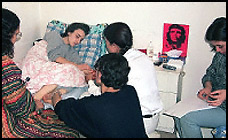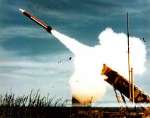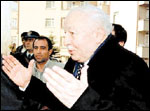27
June 2001
![]()
2. "US warns Iraq after reports of troop buildups near Kurdish areas", the United States on Tuesday delivered fresh warnings to Iraq that it reserved the right to retaliate should it threaten its neighbors following reports of Iraqi troop build-ups near Kurdish areas in the north of the country.
3. "Turkey to take up constitutional amendment package in September", the Turkish government will summon lawmakers back to parliament in September before their summer recess ends to take up constitutional amendments to help Turkey prepare for possible EU membership, Turkish Deputy Prime Minister Mesut Yilmaz said Tuesday.
4. "Neighbors launch diplomatic offense against Turkey on missile defense", Turkey's neighbors, such as Russia and Iran, do not hesitate to pose a threat against Ankara with the nuclear arms capabilities they have.
5. "Turkish Islamists may found three new parties in wake of court ban", reformers and orthodox forge new plans after Virtue Party outlawed.
6. "'All Together Against Capital Punishment'", the '1st World Congress Against Capital Punishment' ended with a great march. Mainly Kurds participated in the march in which important messages were given.
1. - AFP - "Turkish prison hunger strike claims 25th victim":
ANKARA
A long-running hunger-strike over controversial prison reforms in
Turkey claimed a fresh victim on Tuesday, bringing to 25 the overall
death toll of the protest, a human rights activist said. "Aysun
Kayaci, who was on trial on charges of membership of a left-wing organization,
died today (Tuesday) in the Kartal hospital in Istanbul," a spokeswoman
from the Turkish Human Rights Association told AFP.
Kayaci, 25, had been fasting for 183 days and had been recently hospitalised on account of her deteriorating condition, she added. Hundreds of mainly left-wing inmates launched the hunger strike in October last year against the introduction of new jails with tighter security and small cells.The new jails, commonly known as "F-type" prisons, consist of cells holding a maximum of three people, in contrast to existing jails with large dormitories for up to 60 people. Backed by human rights activists at home and abroad, the prisoners argue they would be alienated from fellow inmates and be more vulnerable to ill-treatment and torture by prison officials when locked up in smaller units.
Despite the mounting death toll and international pressure, the government has refused to back down on the introduction of the new prisons. Ankara maintains the packed dormitories are the main factor behind frequent riots and hostage-taking incidents in its unruly jails. In December, thousands of paramilitary troops raided scores of prisons across the country in a bid to break the hunger strike during a four-day crackdown which left 30 prisoners and two soldiers dead.
Since then, more than 1,000 inmates have been transferred
to F-type prisons despite a government pledge that the new jails would
not become operational until a social consensus has been reached on
their introduction. The government has recently adopted a series of
laws to improve conditions for its inmates, but the moves have been
brushed aside by rights activists and civic groups as insufficent. The
prison strike has placed Turkey's bleak human rights record in the international
spotlight at a time when the country needs to make far-reaching democratic
reforms in order to promote its bid for European Union membership. ![]()
2. -AFP - "US warns Iraq after reports of troop buildups near Kurdish areas":
WASHINGTON
The United States on Tuesday delivered fresh warnings to Iraq that
it reserved the right to retaliate should it threaten its neighbors
following reports of Iraqi troop build-ups near Kurdish areas in the
north of the country.
State Department spokesman Richard Boucher would not comment on the validity of the reports but said Washington had seen them and was "trying to establish the facts on the ground." And, he said that if Iraqi President Saddam Hussein made a move against the Kurds, neighboring countries or US troops or reconsituted its weapons of mass destruction, the United States was prepared to react militarily. "We do maintain a credible force in the region," Boucher told reporters. "We're prepared to act at an appropriate time and place of our choosing."
His comments followed weekend reports in the British press
that Iraqi troops are massing in the northern no-fly zone, patrolled
by US and British pilots, for a possible incursion into Iraqi Kurdistan.
On Monday in New York, Secretary of State Colin Powell was asked about
the reports and said he would look into them, although he stressed that
he had not seen anything "that causes me a heightened level of
concern."![]()
3. - AP - "Turkey to take up constitutional amendment package in September":
ANKARA
The Turkish government will summon lawmakers back to parliament
in September before their summer recess ends to take up constitutional
amendments to help Turkey prepare for possible EU membership, Turkish
Deputy Prime Minister Mesut Yilmaz said Tuesday. "We have agreed
to call parliament back to work on September 17," Yilmaz said after
a meeting of the coalition leaders, the Anatolia news agency reported.
The Turkish parliament is scheduled to go on summer recess on July 1 until October. Yilmaz added that a working group consisting of deputies from all parties in parliament would work on the existing draft package and finalize it before September. "What is important for us is to adopt the amendments by October so that they are mentioned in the (EU commission) monitoring report in November," he said.
Among the 37 constitutional amendments in the draft, which can still be changed before it reaches the parliament floor, is a clause to lift the death penalty except in times of war, an immminent threat of war and for crimes of terrorism. The "terrorism" clause was specially formulated to exclude Abdullah Ocalan, the head of the outlawed Kurdistan Workers Party (PKK), which has waged a 15-year war for self-rule in mainly Kurdish southeast Turkey. Ocalan was sentenced to death on treason in 1999, but his execution was put on hold by Ankara following a request from the European Court of Human Rights. Turkey has not carried out an execution since 1984 under a de facto moratorium. The draft also proposed the lifting of a ban on using "forbidden languages" in the expression and dissemination of thought, which could allow the free use of Kurdish in the media. It also envisaged the introduction of tighter criteria to ban a political party and the inclusion of more civilian members to the country's top policy-making body, the military-dominated National Security Council.
Other proposals aim to improve freedom of expression,
expand workers' rights to unionize and limit the president's powers.
Turkey was declared an EU membership candidate in December 1999 and
is now obliged to meet the European Union's criteria on human rights
and democracy before it can start accession talks. ![]()
4. - Turkish Daily News - "Neighbors launch diplomatic offense against Turkey on missile defense":
By Lale Sariibrahimoglu 
Turkey's neighbors, such as Russia and Iran, do not hesitate to
pose a threat against Ankara with the nuclear arms capabilities they
have. But when it comes to Ankara seeking to acquire defensive systems
as a deterrence against the ballistic missiles proliferated in Turkey's
environs in particular, including Iran, those same neighbors start bombarding
Ankara with critical remarks.
A recent one came from Iran, which in cooperation with countries including Russia has been developing Shaab ballistic missiles which has the potential of becoming an intercontinental missile.
The pro-government Iran News, in an article on June 23, strongly criticized Turkey's ongoing, first ever tri-party air exercises in the central Anatolian town of Konya with Israel and the United States, code-named Anatolian Eagle. The paper argued that the multilateral pact between Turkey, the United States and Israel has been ongoing despite the opposition raised by regional countries. "Turkey disregards that opposition and appears to be continuing this same policy," the paper commented, adding that those three countries agreed on the United States' missile defense project ignoring regional concerns. The paper further described a missile defense deal between the three countries as an attempt to divert attention from what it claimed to be Turkey's economic crisis and its instable social order.
Similarly, Russia's counsellor at the Russian Embassy in Ankara Nikolay Fomin, raised his country's suspicion over the United States' missile defense system, urging Turkey to consult with Moscow over its plans on missile defense.
"Both the regional missile defense as well as the U.S. missile defense plans will affect Russia due to its proximity to Turkey. Why do you [Turkey] accelerate the threat?" Fomin asked.
The Russian counsellor also raised hopes that missile defense will be among topics to be discussed bilaterally between Turkey and Russia once intensive political dialogue on both the regional and the bilateral level has become structured, as was agreed by Turkish Foreign Minister Ismail Cem and Russian Foreign Minister Igor Ivanov in Ankara on 8 June.
The details on which topics will be included in the structural consultation mechanism to be set up will be discussed later but Russian counsellor Fomin sees this as an important step for establishing better understanding between Ankara and Moscow over regional issues such as the Caucasus, which both countries are rivals over, as well as on energy projects and regional security.
Missile defense
Meeting with American correspondents on June 18, Russian President Vladimir Putin said that if the United States proceeded on its own to construct a missile defense shield over its territory and that of its allies, Russia would eventually upgrade its strategic nuclear arsenal with multiple warheads -- reversing an achievement of arms control in recent decades -- to ensure that it would be able to overwhelm such a shield.
The fact that many rogue states that the United States defined as potential threats of ballistic missiles are located in Turkey's environs, such as Iran and Iraq, brings this country to the forefront in arguments surrounding anti-ballistic missile defense.
The missile defense, which also envisages the deployment of systems in space to intercept enemy missiles before reaching the territories of allies and the United States', friends has a regional dimension that Turkey and Israel, under the auspices of the United States have been engaged in.
The United States seeks to cancel the 1972 Anti Ballistic Missile (ABM) Treaty and unilaterally cut strategic nuclear weapons to the lowest possible number.
The second trilateral Theater Missile Defense (TMD) meeting between Israel, Turkey and the United States is scheduled to be hosted by Tel Aviv sometime this summer. The first trilateral meeting was held in Washington last December.
The aim of those meetings is to find ways in which a regional defensive system against ballistic missile threats that may come from Turkey's southern and southeastern neighbors could be established.
As one senior Turkish general argues, Turkey should look for means to protect its own security, but this does not prevent Ankara from entering into regional cooperation with countries like Russia.
Russian counsellor Fomin recalled that Norway recently
deployed on its territory an early warning system 40 kilometers off
the Russian border, thus covering a part of Russian territory. "If
the United States talks about a missile defense against rogue states,
Russia has the right to ask the question why the Norwegian early warning
systems were installed covering part of Russian territory? We are talking
about this issue with Norway openly," Fomin added. ![]()
5. - Frankfurter Rundschau - "Turkish Islamists may found three new parties in wake of court ban":
Reformers and orthodox forge new plans after Virtue Party outlawed
ATHENS
Far from putting an end to political Islamism in Turkey, the country's
Constitutional Court ban on the Virtue Party (FP) last Friday will probably
result in the founding of two or even three new, religion-oriented parties.
After the court announced its decision, the FP's 102 parliamentarians held their last group meeting. Many of them were in tears. This is "wrong and unfair," said FP leader Recai Kutan, adding that court decision diminishes "us in the eyes of the whole world." At the same time, Necmettin Erbakan, the 76-year-old veteran leader of Turkey's Islamist movement, urged an audience of some 15,000 in an Istanbul sport arena not to give up. "No one," he thundered, "can silence the people's voice!" And the people roared back with one voice: "We are the army, you are our commander." "We miss you," read one banner in the arena. "Turkey without Erbakan is like a child without its mother", said another.
Called hoca - great teacher - by his followers, Erbakan already knows what being banned is like. Since 1971, four parties that he either founded or inspired have been outlawed. His political career peaked in 1996, when he was elected prime minister, the first Turkish Islamist to reach that office. But within a year, the country's military had ousted him from office. In 1998, his Welfare Party was banned and he was barred from politics for five years. But behind the scenes, he pulled the strings in the Virtue Party, which succeeded the Welfare Party.
Despite that, the Virtue Party suffered for years from internal power struggles between orthodox, Erkeban loyalists and a group of reformers. Both groups number about half of the total 102 member Virtue Party parliamentary delegation. In the wake of the ban on the party, the two wings will probably found parties of their own.
Just as Erkeban pulls the strings in the Islamist faction, the reformers have their own leader, former Istanbul mayor Recep Tayyip Erdogan. Like Erkeban, Erdogan too has been banned from politics.
During his time as mayor, in the mid-'90s, his efficient local government won him the support of many voters outside the usual Islamist constituency. Because Erdogan himself has been banned from political activity, observers count Abdullah Gul, his deputy in the FP's reform faction, as the most likely candidate the head the reform wing's new party.
Ankara Mayor Melih Gokcek reportedly also nurses ambitions of starting a reform-oriented, Islamist party.
The conflicting forces unleashed by the ban on the FP
will probably splinter Turkey's political scene even further, at least
at first. But the prospect that it will permanently shatter the county's
Islamist movement, as many moderate politicians hope, may turn out to
be little more than a pipe-dream. In the long run, the reformers will
probably attract the most substantial following. The established parties
have lost the voters' confidence - the most recent opinion polls show
none of them topping the ten-per cent hurdle they'd have to overcome
to get into parliament. With such a seriously disaffected electorate,
a moderate Islamist party like the one proposed by Erdogan could produce
some real surprises. ![]()
6. - Kurdish Observer - "'All Together Against Capital Punishment'":
The '1st World Congress Against Capital Punishment' ended with a great march. Mainly Kurds participated in the march in which important messages were given.
HUSEYIN ELMALI/STRASBOURG
The three days of activities of the '1st World Congress Against
Capital Punishment,' which began on Thursday, June 21, in the French
city of Strasbourg, ended with a march in which over 5,000 people participated.
Most of those joining the march were Kurds.
Ocalan and Jamal pictures up front
The march began in front of the Council of Europe building and ended in front of the municipal building in Place d'Etoile square. Those at the lead of the march carried pictures of PKK President Abdullah Ocalan and Mumua Abu Jamal. Ocalan's attorney Dogan Erbas, one of the congress' organizers Michel Taube, US Black leader Angela Davis and a number of European parliamentarians and local politicians were among those who marched at the head of the parade and carried the pictures. The marchers also carried a large banner reading "All Together Against Capital Punishment" in Kurdish, Turkish, and seven other languages. While the large participation of Kurdish women was noteworthy, there were also Iranian and Turkish leftists in the march, who carried pictures of those who had been executed in Iran and those who had lost their lives on death fasts in Turkish prisons. There were no signs bearing political messages carried in the parade, however, and no political slogans. It was noteworthy that there were large numbers police to protect the US and Turkish embassies, while there were no police in front of the other embassies along the march route. Kurds shouted "Long live President Apo" at the end of the march.
We came together against capital punishment
PKK President Abdullah Ocalan's Attorney Dogan Erbas, former French Culture Minister and Strasbourg Mayor Catrina Trautman, congress organizer Michel Taube, and French Black parliamentarian Bodee Silar made the following comments on the march to our newspaper.
Dogan Erbas: Nongovernmental organizations and politicians took a clear stance in the European Parliament and Council of Europe yesterday against the implementation of the death penalty. Today, persons from many peoples are again working hand in hand to say no to capital punishment. I am clearly and unconditionally saying no to the implementation of this barbaric punishment. This is the joint voice of humanity and I want to believe it will be heard.
Catrina Trautman: Different people put all their political concerns to one side today and came together and we condemned this modern practice of murder carried out by the state. We won't stay here, I will bring this to Socialist International, of which I am a member. I believe they will sign final declaration.
Michel Taube: I heard yesterday that the Turkish government met and discussed capital punishment and announced that they would not be abolishing the death penalty in the short term. We see Turkey as a European country. If they have any doubts about this, then they will completely lift this punishment that all the Europeans have lifted.
Bodee Silar: If Turkey wants to come to European democracy,
let it give account of this. It was very meaningful that Ocalan and
Jamal's pictures were carried here. Both of them have become the most
recognized people who have received the death penalty and have become
symbols.![]()